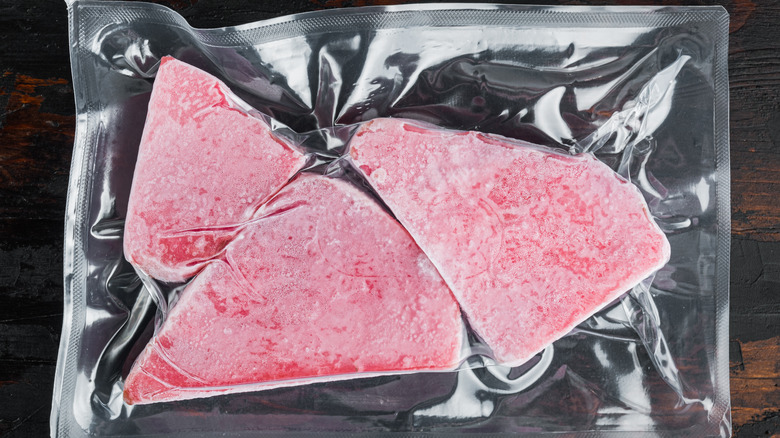The Crucial Step You Should Take Before Freezing Tuna Steaks
Seafood's quality is primarily marked by its freshness. Because fish exist in colder environments than mammals, seafood tends to spoil faster than other meats, with fresh fish deteriorating after just one or two days in the fridge. Fish like tuna, in particular, have a higher fat content than lean fish like flounder, making them more susceptible to lipid oxidation — a reaction that occurs when fatty acids are exposed to oxygen, altering the fish's taste, smell, and color.
While freezing works to preserve food by impeding the reproduction of food-spoiling microorganisms, it does little to prevent lipid oxidation. A 2022 study published in the journal Foods indicated that the byproducts of oxidation continue to amass in frozen tuna the longer it's stored in the freezer. To prevent tuna steaks from turning rancid during storage, you might want to try dipping them in an ascorbic acid solution before freezing.
Ascorbic acid, otherwise known as vitamin C, is a frequently used food additive recognized for its ability to prevent fat oxidation. As far as tuna is concerned, the National Center for Home Food Preservation (NCHFP) says submerging your raw steaks in a solution of crystalline ascorbic acid and cold water for 20 seconds is the secret to maintaining quality during long-term storage.
Vitamin C keeps your tuna steaks looking and tasting fresh
Both in the body and in food products, vitamin C acts as an antioxidant, scavenging for reactive oxygen species (ROS). A byproduct of cell metabolism, ROS are free radicals that can encourage lipid oxidation, accelerating the rate of food spoilage — even in the freezer. In meat products, lipid oxidation begins immediately post-mortem. As such, vitamin C, which dissolves in water, works best as a preservative when applied during food processing (as opposed to fat-soluble vitamin E, which is typically used as an additive in fish and animal feed), according to a 2013 study published in Food Industry.
When myoglobin — the protein that gives tuna its deep red color — undergoes oxidation, it becomes metmyoglobin. This transformation often turns tuna steaks into an unappetizing shade of brown. Luckily, dipping tuna steaks in a solution of ascorbic acid and water works as an effective anti-browning agent. While the effectiveness of ascorbic acid's ability to keep frozen tuna looking and tasting fresh depends on the solution's concentration, the NCHFP says a ratio of 2 tablespoons of ascorbic acid to 1 quart of cold water should suffice. After being dipped in the vitamin C solution, individual steaks can be coated in plastic wrap before being sealed in an airtight, freezer-safe container or bag and tucked in the back of the freezer (where it's coldest). Your tuna steaks can remain frozen for three to eight months.

